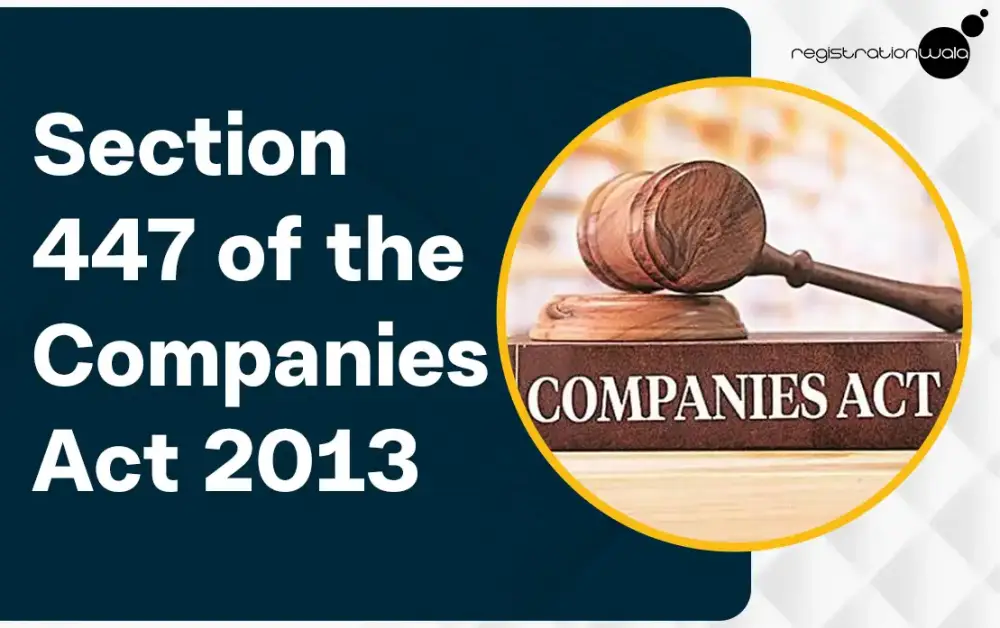Understand Section 447 of the Companies Act 2013
- November 04, 2024
- Registrationwala

- Home
- /
- Knowledge Base
- /
- Business Registrations
- /
- Company Registration
- /
- Understand Section 447 of the Companies Act 2013
Understand Section 447 of the Companies Act 2013
Laws are extremely important for any society. They protect the rights of everyone, ensure the common good, reduce corruption and conflict, support development and maintain peace in the society. If there were no laws with legal provisions for punishing criminals, every other person or business would be a criminal or fraudster in one way or the other.
Every person knows about the Companies Act 2013 but only a selected few know about Section 447 of this Act. Chapter XXIX of the Companies Act, titled “Miscellaneous”, provides Section 447, which explains the meaning of fraud and lays down punishment for the same. Through this blog post, we’ll explain section 447 of the Companies Act 2013.
Meaning of Fraud According to Companies Act 2013
The term fraud has been defined in the Companies Act 2013 under section 447 (1). According to this section, fraud has been defined as any act or omission, including a misrepresentation, by a director or any other person, whether a party to the fraud or not, which involves any fraud by him or any other person, or a willful concealment of any material facts from any person with the intent to deceive, and thereby prejudice the interests of the company, its shareholders or creditors.
Further, the section states that if a company has been already established, the intention of the directors or other persons participating in the fraud must be to cause wrongful loss to the company or wrongful gain to the company or any other individual.
Investigation Procedure under Section 447 of Act
Section 447 (2) of the Companies Act 2013 provides that if any person has committed any fraud in connection with promotion, formation, management or winding up of company, in the eyes of the Central Government or any other regulatory body, then the Central Government may, either suo-motu or upon complaint, direct the Serious Fraud Investigation Office under the Central Government’s control to investigate the fraud and submit such investigation’s report to the Central Government.
What happens if an Individual commits Fraud under Section 447?
If an individual commits a fraud he is found guilty of, then under Section 447 of the Act, he’ll be punished. Let’s find out the punishment for committing large-scale fraud and smaller-scale fraud in accordance with s. 447.
-
In case fraud committed is large-scale i.e., it involves at least Rs. 10 lakhs or 1% of company’s turnover, then the punishment can range from 6 months to 10 years imprisonment, along with a fine of at least the amount involved in fraud and upto 3 x the amount. The minimum imprisonment would be 3 years if the public has been affected due to the fraud.
-
In case fraud is committed on a small-scale i.e., it involves less than Rs. 10 lakhs or 1% of the turnover of the company, and it doesn’t affect the public, the punishment would be up to 5 year imprisonment or a fine of up to Rs. 50 lakh or both, depending on the fraud.
Sections under which S. 447 Punishment is Applicable
There are approx. seventeen sections in the Companies Act 2013 where punishment read under s. 447 is attracted.
Section 448
This section of the Act deals with cases wherein false statements are made or facts are omitted, in both cases, knowing the reality of the same. The false statements can be made in relation to statements, returns, prospectus or any other document.
Section 251
This section deals with fraudulent applications for the name removal. If an application is made with an intent to evade the liabilities of the company, it shall be liable under s. 447.
Section 229
This Section of the Companies Act 2013 deals with imposing a penalty on any officer or any person or any company’s employee who is required to provide information or make a statement during an inspection, instead furnishes a statement that is false or destructs or mutilates documents.
Section 86
The penalties for contravention are provided under Section 86 of the Companies Act 2013. When someone willfully provides inaccurate or fraudulent information or willfully withholds important information, Section 86(2) invokes Section 447.
Section 8
The creation of businesses with philanthropic or charitable purposes is covered under Section 8 of the Act. When a corporation utilizes fraudulent tactics and fails to comply with the section's standards for managing its affairs, Section 8(11) of the Act invokes Section 447. You may also read Annual Compliances of Section 8 of Companies Act, 2013
The processes outlined under several other complementary and extra provisions must be followed in order to take actions and penalize anyone under Section 447 of the Companies Act 2013.
Conclusion
Section 447 of the Companies Act 2013 explains the meaning of fraud and contains provisions for punishing or penalizing those involved in the fraud. The Act explains that if a person cheats, lies or tricks people in matters related to the company, it is known as fraud. If a person is found guilty of fraud by the court, then according to the Act, he/she can end up in jail from anywhere between minimum 6 months to maximum 10 years. Along with this, the person is also required to pay a fine which is equal to the amount of fraud done, or 3 times the amount. If the public is affected by the fraud, then the punishment can be stricter.
Want to register a company and ensure smooth corporate governance and a transparent business environment from the beginning? Connect with Registrationwala consultants!
- 693 views
